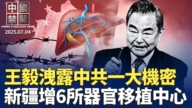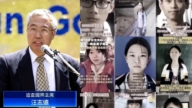【新唐人2013年03月30日讯】28号,国务院办公厅下发有关:实施《国务院机构改革和职能转变方案》任务分工的通知。通知说,用3到5年时间,完成《方案》提出的各项任务,并且依年限列出各阶段任务。但民众反馈说,看了半天,仍然看不出“改革”的实质内容,专家也怀疑能否奏效﹖所谓“国务院机构改革”,是不是像专家所说是“治标不治本”的改革﹖或是“新官上任三把火”的举动,一起和本台记者去了解。
国务院通知实施的《机构改革和职能转变方案》任务,共分为4项,如2013年应完成的任务,包括组建中国铁路总公司等29项;2014年共28项应完成的任务,包括:下放一批国家采用补助、贴息等方式扶持地方的项目。
还有2015年完成的任务,共11项;2017年完成的任务,共4项。
网友(佛山飘歌)说:看了半天,仍然看不出“改革”的实质内容。
而时事评论员蓝述表示,中共政权在过去30年所谓的改革开放中,整个经济发展,如GDP增长,都是政府大规模的盲目投资,很多重复的项目难以为继,造成巨大的浪费。蓝述说,这就是中共目前不得不面对的问题。
时事评论员蓝述:“铁道部实际上就是一个亏损巨大的国营企业,这次它要把它公司化,这就是一个最典型的例子。机构精简了,从而造成经济大规模下滑,到那个时候,导致中共执政合法性危机进一步加剧的时候,在那个时候,它还会不会继续它现在所高喊的这种机构改革,和对项目的上马进行严格的控制等等,就是大家拭目以待的问题。”
蓝述认为,中共政权缺少透明性,又不进行体制改革,权力一直以来没有受到监督,这是机构改革无法奏效的最根本问题。
另外,美国“南卡罗来纳大学”经济学系教授谢田也表示,大陆国务院最近出台的机构改革、职能转变方案,仔细看的话,实际上出不了“新官上任三把火”这样的举动。
美国“南卡罗来纳大学”经济学系教授谢田:“因为呢,我想任何一个官僚在任何一个位置上,不管他是民选的、还是专制的、还是任命的,他总是想有所突破。做出自己的一些成绩,跟他前任有所区别。尤其是在胡温体制之下,中国的经济现在是千疮百孔,债务累累,负担沉重。如果想摆脱这个局面,清除自己的包袱,他们也必然会在机构改革和职能转变方面做一些努力。”
谢田预计国务院这种枝节上的改革,治标不治本,注定不会产生任何效果。
谢田:“比方说,它现在说2013年要完成的任务,据说有二十九项,大部分属于严格控制呀,控制审批呀、审核呀、合并呀、减少一些投资项目呀,下放一些,分权一些,说来说去这都是治标不治本的做法。中共国务院不动产登记条例也是,我想中共政府出台这个呢,显然是想安抚中国民众,让人们不会那么愤怒。”
谢田说,中国的房地产都是被控制的,大量的房地产都在中共贪腐的官员名下,在既得利益集团手中,中国老百姓对此已经深恶痛绝。
谢田:“一方面一个……哪怕是一个中下级的官员,都会有十几到二十几套房子,对于老百姓来说呢,他们可能不吃不喝四十五年才能买得起一栋房子。显然这种状况是不能够持续下去的。所以他出台的条例,与其说是真正想整顿房地产市场呢,我认为不过是做出一个姿态给老百姓展示一下他们这个安民、抚民的一个心愿。”
谢田认为,中国的体制改革,如果不“治本”,不把共产党这个专制体制从根子上拔掉的话,目前国务院这种头痛医头,脚痛医脚的办法,注定不会实现真正的政治改革。
采访/朱智善 编辑/周平 后制/周天
CCP Publishes Tasks Timetable of Institutional Reform
On March 28, the General Office of China State Council
published a task allocation notice of implementing
“The Program of Institutional Reform and
Functional Transformation of the State Council”.
It said that it will take three to five years to complete
all tasks in the program, and will list the schedule by year.
But the Chinese people said that they didn’t find any
solid content about reform in the program.
Experts also doubted the effectiveness of the program
Is this so-called “State Council Institutional Reform“ a “palliative” reform?
Or is it just an action of “new leader lights three fires
after taking office”? Let’s see the report!
There are four tasks of the State Council’s institutional
reform and functional transformation program.
For example, tasks for 2013 include setting up
the China Railway General Company and 28 other tasks.
There are 28 tasks in 2014 which include a launch of projects
to support local government by giving subsidies and deduction related interest, etc.
There are 11 tasks in 2015, and 4 tasks in 2017.
Foshan Piaoge, a netizen said: “I didn’t find any solid content
about reform although I read it for a long time.”
Lan Shu, a political commentator said in the past 30 years,
the period of so-called Reform and Opening-up,
the CCP regime has controlled the whole economy .
It has launched many large scale investments
which were only for a GDP number.
Many projects are overlaid, resulting in a huge amount of waste.
Lan Shu says this is the problem the CCP has to face today.
Lan Shu, political commentator: ”The Ministry of Railways
is actually a huge loss-making state-owned enterprise.
It’s a typical example that it was changed into a company.
Streamlining the organization will lead the economy to
decline dramatically.
Furthermore it will lead the crisis of legitimacy of
the CCP’s rule to become worse and worse.
At that time, can the CCP chance this kind of reform
any more ? Will it strictly control coming projects?
These are the points that people should focus on.”
Lan Shu thinks that the CCP rule lacks transparency
and system reform.
Its power hasn’t been monitored for such a long time
and this is the most fundamental reason for institutional reform not being effective.
In addition, Xie Tian, an economics professor from the U.S.
University of South Carolina said that if we look it carefully,
we will find that the newly published program of
institutional reform and functional transformation
is still the “A new official applies strict measures.”
Xie Tian: “I think every official, no matter if he is
voted in by people, or despotic, or appointed,
always wants to achieve a breakthrough, to have achievements
which will distinguish him from his predecessor.
Especially in the Hu-Wen system, China’s economy was
riddled with debt, and a heavy burden.
To get rid of this situation, to ease the burdens,
the CCP’s new leaders have to make some effort on
institutional reform and functional transformation.”
Xie Tian expects that the reform of the State Council
is merely a palliative, and destined to have no real effect.
Xie Tian: “For example, it said that it will finish 29 tasks
in 2013, most of which are strict control, control approval,
audit, merge, reduce the number of the investments,
it will authorize some power to lower level,
decentralize powers, but all of these are palliatives.
It’s obviously a solution to appease Chinese people,
and stop them being so angry.”
Xie Tian said that China’s real estate market is controlled,
a large number of real estate belongs to corrupt
CCP officials, and in the hands of vested interests’ groups.
Chinese people have always hated it deeply.
Xie Tian: “On the one hand, even a subordinate official has
one or two dozen sets of real estate, but as for ordinary people,
they only have enough money to buy real estate after
45 years’ of hard work without eating properly.
Things obviously can’t go on like this,
and then it published the program.
It doesn’t really want to straighten out
the real estate market.
I think it just wants to put on a show for the
Chinese people in an attempt to keep them calm.”
Xie Tian thinks China’s system reform doesn’t “cure
the root”, doesn’t remove the dictatorship from its root,
the State Council’s current advice applies cure the head
when the head is aching, cure the foot when it is in pain
this solution is destined to fail in realizing true reform.




























